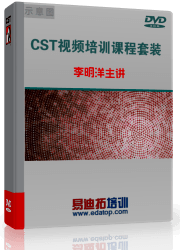- 易迪拓培训,专注于微波、射频、天线设计工程师的培养
Magnetostatic CST boundary condition problems
录入:edatop.com 点击:
Hi All,
I'm simulating a magnetostatic problem involving two magnets separated by a thin copper spacer. The total magnetic assembly is on the order of 10 mm cubed. The magnetization is in the same direction and I use open boundary conditions on all sides.
The problem is that I find that the height of the magnetic field zero point moves around 200 um each way depending on my selection of free space that I select for the background. I have done simulations for 50-300 mm of space on all sides and there is quite a spread of values of the nil in a non linear way. My mesh size is 200 at the moment with a minimum measurement value of 0.05 of a mesh. Please, does anyone know why this would be happening and what I can do to get a consistent magnetic field zero zero height result from my simulations.
Many thanks,
mimeo
I'm simulating a magnetostatic problem involving two magnets separated by a thin copper spacer. The total magnetic assembly is on the order of 10 mm cubed. The magnetization is in the same direction and I use open boundary conditions on all sides.
The problem is that I find that the height of the magnetic field zero point moves around 200 um each way depending on my selection of free space that I select for the background. I have done simulations for 50-300 mm of space on all sides and there is quite a spread of values of the nil in a non linear way. My mesh size is 200 at the moment with a minimum measurement value of 0.05 of a mesh. Please, does anyone know why this would be happening and what I can do to get a consistent magnetic field zero zero height result from my simulations.
Many thanks,
mimeo
申明:网友回复良莠不齐,仅供参考。如需专业解答,请学习易迪拓培训专家讲授的CST视频培训教程。
上一篇:converting cst to dxf and dxf to eps
下一篇:Combine results in CST in one port

